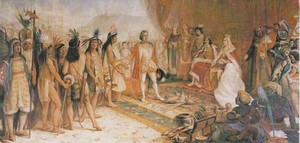 "
"
Every year on the second Monday of October, something very ironic takes place at Notre Dame. What is probably the only school in the country with ten murals of Christopher Columbus in its Main Building is also one of the only schools in the country that doesn’t give its students Columbus Day off.
Although these two realities seem to conflict, they perfectly capture how Notre Dame as a whole feels about the figure of Christopher Columbus and the recognition of Columbus Day: conflicted.
For years, students have protested against the holiday and the murals. Some faculty members have made the murals and the holiday a large talking point of their classes. And the university has even put a disclaimer in a pamphlet explaining why murals of someone who is hated by many adorn the walls of Main Building.
Despite this controversy, the murals should stay up, and regardless of whether or not school is cancelled, the holiday should remain a national holiday.
I don’t think this because I love celebrating the genocide of an entire race of people, because I am impressed by the fact that Columbus enslaved most of the island of Hispaniola or because I like that centuries of civilization and culture collapsed shortly after his arrival.
Columbus Day and the murals should stick around because of the great things that Columbus did accomplish, not because of the things that are horrible and heinous.
During the federal holiday celebrating George Washington’s birthday, we don’t celebrate the fact that he probably killed thousands of British soldiers who were genuinely good people, or the fact that he owned upwards of 300 slaves at once. Rather, we focus on the fact that he freed the colonies from foreign oppression and established a nation built on freedom and liberty.
Similarly, Columbus Day wasn’t established to glorify genocide and the mistreatment of native populations. It was established to celebrate the discovery of the New World, the exchange of ideas and cultures between the new and old worlds and the spirit of discovery.
As Franklin Delano Roosevelt put it when he proclaimed the second Monday of October to always be a federal holiday during the violence and turmoil of World War II: “We can revitalize our faith and renew our courage by a recollection of the triumph of Columbus after a period of grievous trial.” Roosevelt didn’t create the holiday because Columbus established a society that loved genocide and murder, but because he “created the America to which the Old World contributed so magnificently.”
Yes, you can always take the self-righteous path of not wanting to celebrate one of the largest genocides the world has ever seen.
Maybe you can even quote Robert California from the television show “The Office” when he asks Andy if he really wants a three and a half day week to celebrate the genocide of an entire people.
You can do all of those things, but at the end of the day, you will be looking at the glass half empty.
There is much more to be gained from the celebration of Columbus Day and the values it upholds than there is from criticism of it.
Make Indigenous People’s Day, Bartolome De Las Casas Day or Reservation Day holidays — just make them on a different day.
Don’t abandon an almost century-old holiday that celebrates our continent and the exploration, perseverance and exchange of cultures for the sake of the shortcomings of a 15th-century explorer.
The views of this author are not necessarily the views of Scholastic magazine.